人教版七年级下册Unit 5 Why do you like pandas?单元复习知识点课件(共30张PPT)
文档属性
| 名称 | 人教版七年级下册Unit 5 Why do you like pandas?单元复习知识点课件(共30张PPT) | 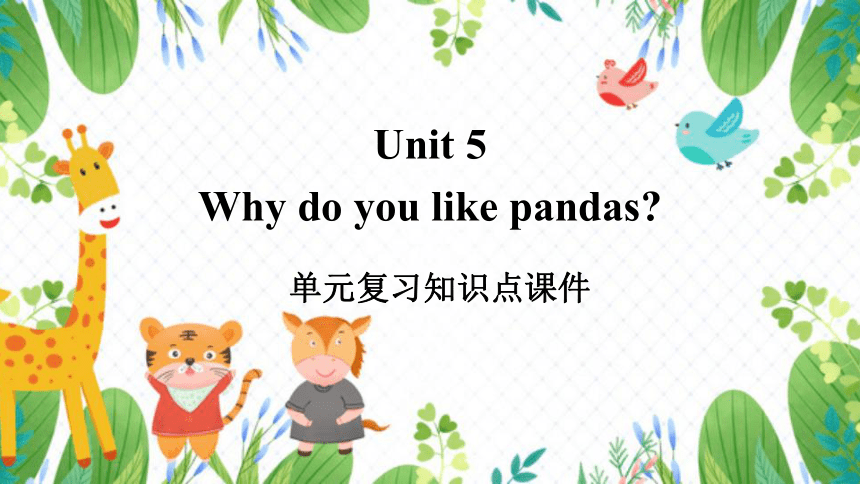 | |
| 格式 | zip | ||
| 文件大小 | 1.4MB | ||
| 资源类型 | 教案 | ||
| 版本资源 | 人教新目标(Go for it)版 | ||
| 科目 | 英语 | ||
| 更新时间 | 2023-04-10 22:13:20 | ||
图片预览

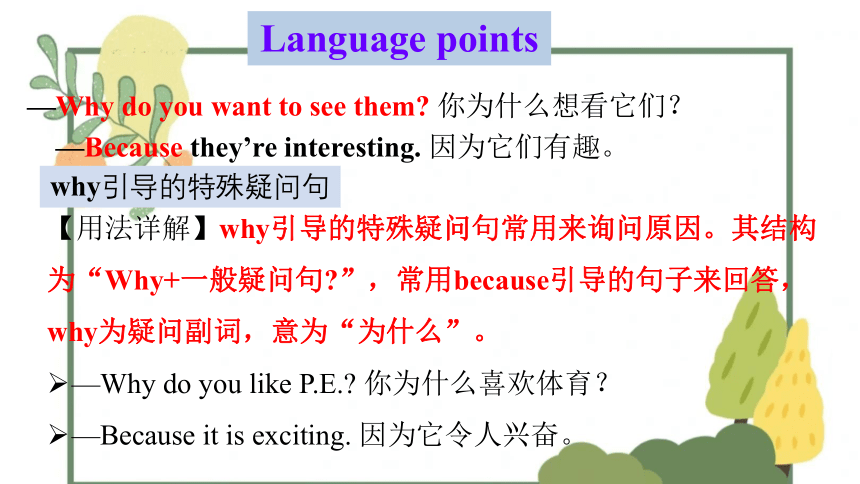
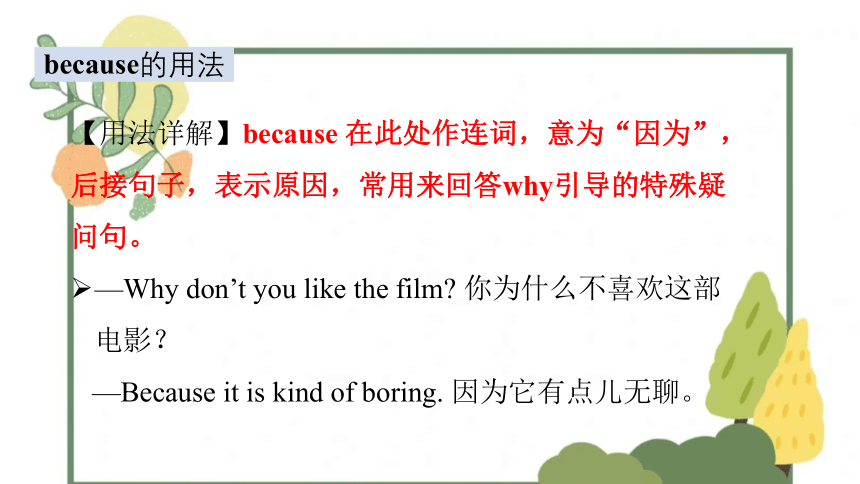
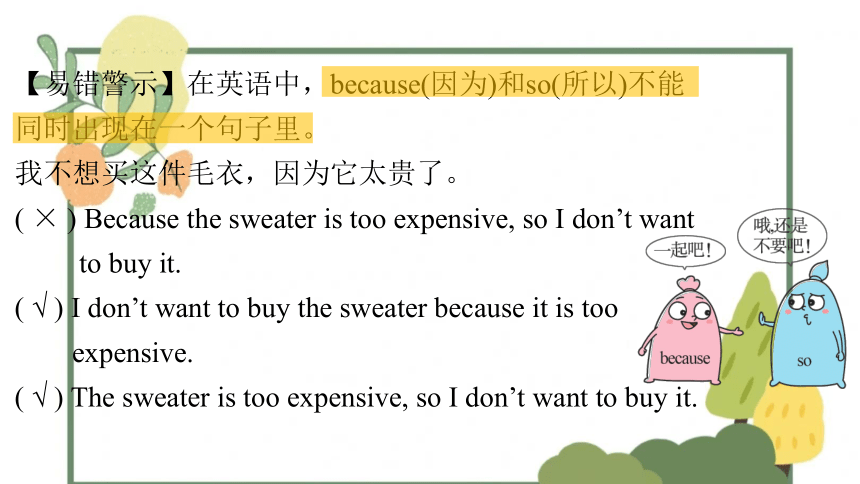
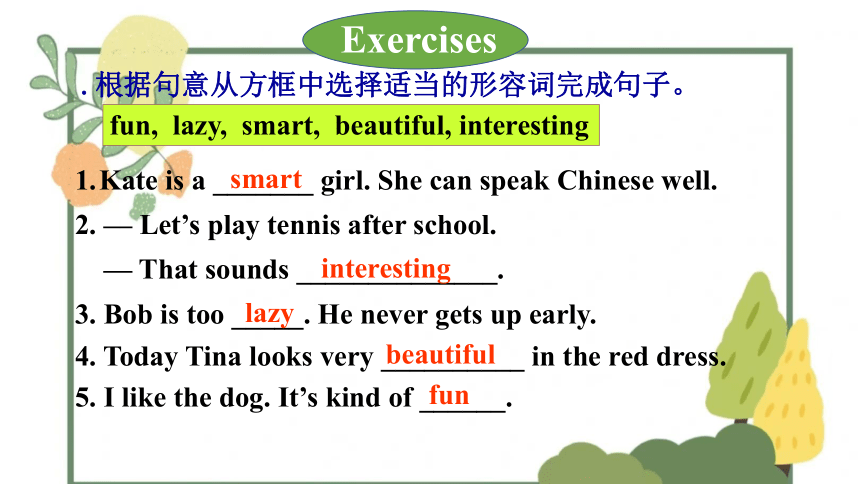
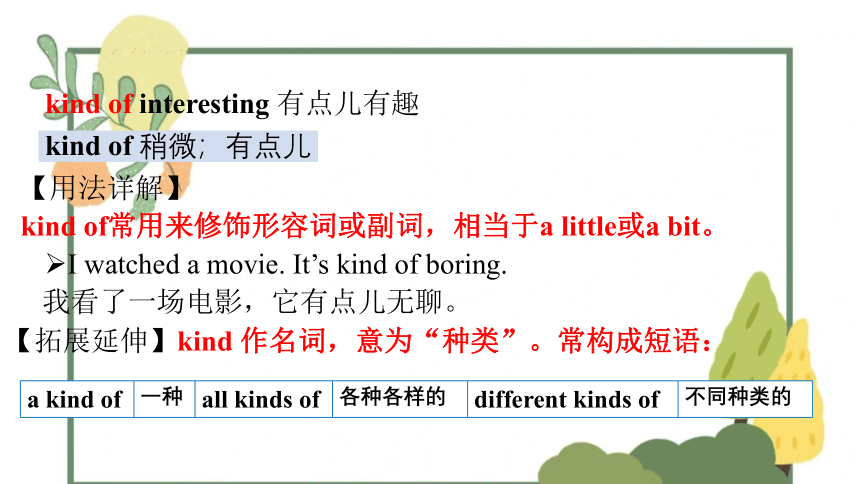
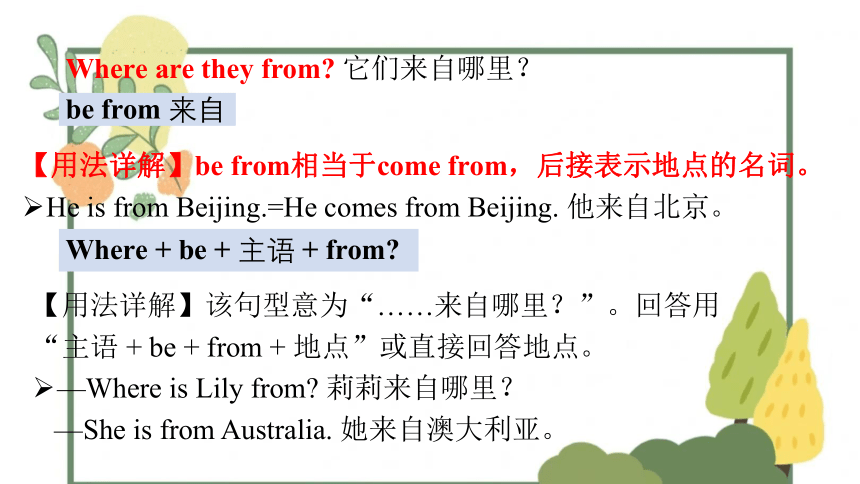
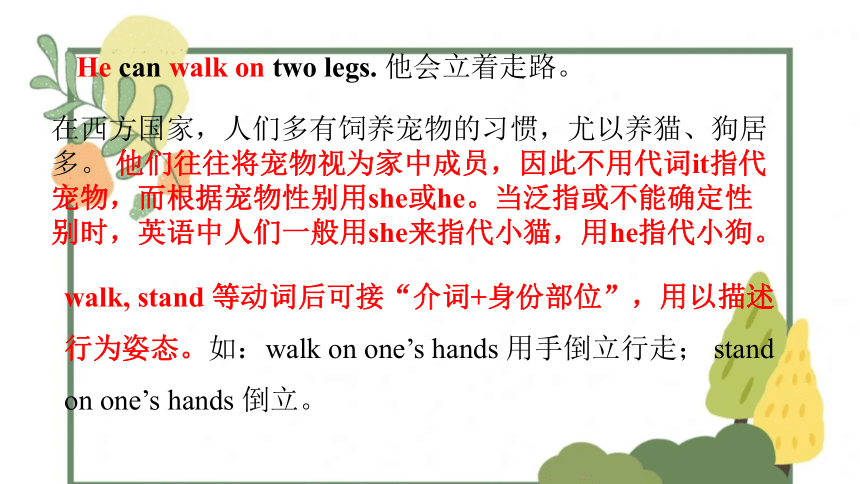
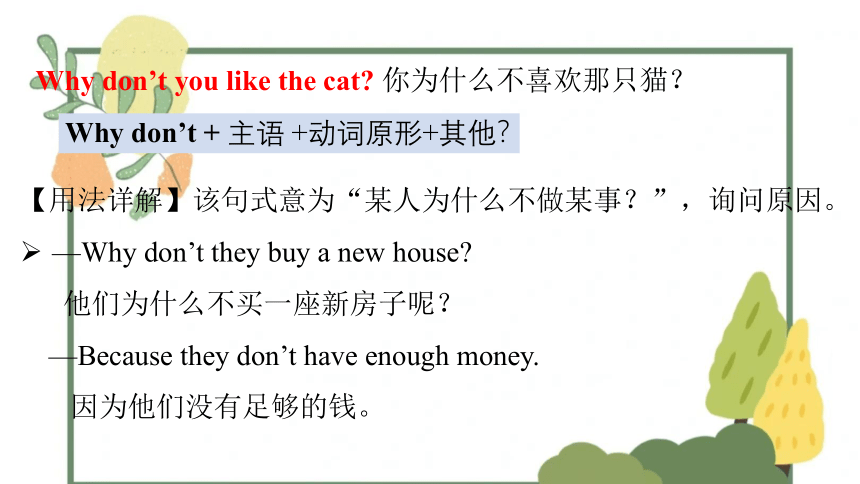
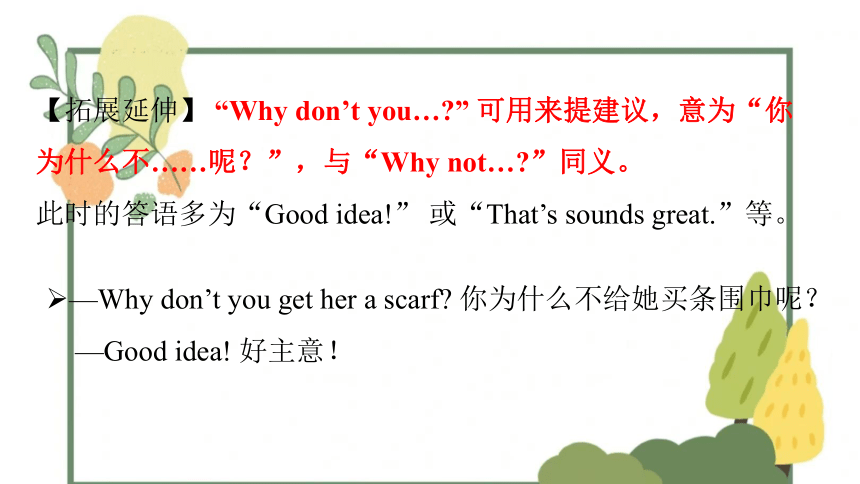
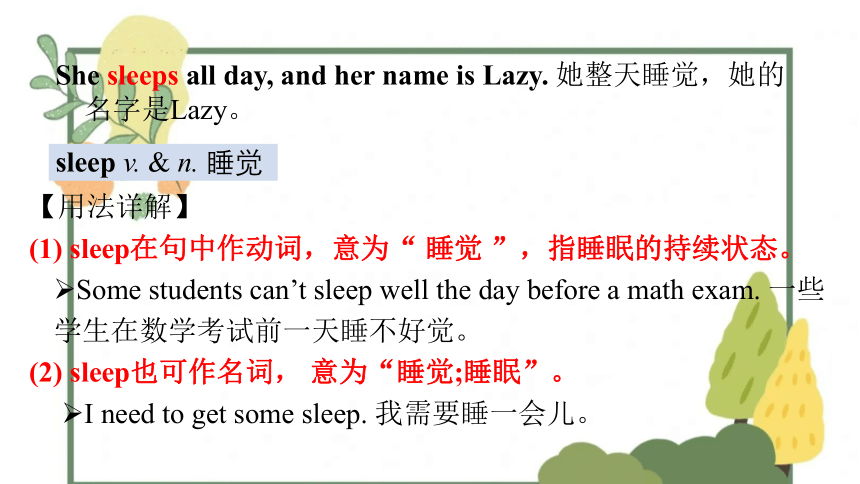
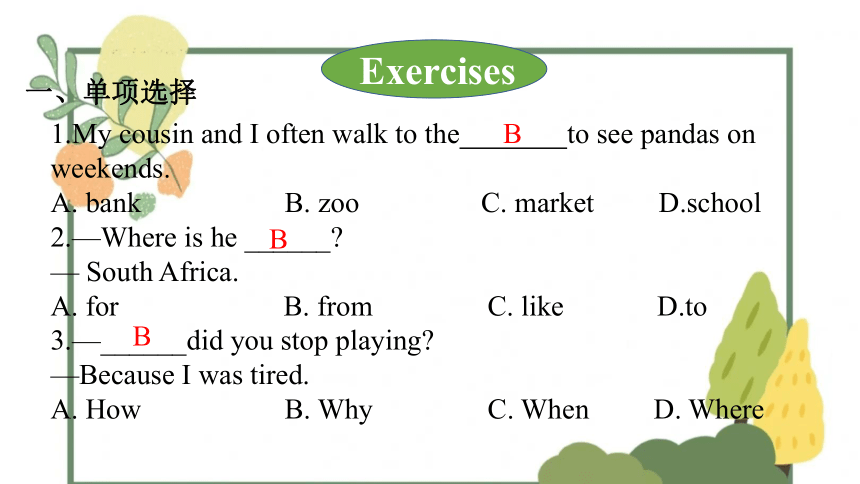
文档简介
Unit 5
Why do you like pandas
单元复习知识点课件
Language points
【用法详解】why引导的特殊疑问句常用来询问原因。其结构为“Why+一般疑问句 ”,常用because引导的句子来回答,why为疑问副词,意为“为什么”。
—Why do you like P.E. 你为什么喜欢体育?
—Because it
( × ) Because the sweater is too expensive, so I don’t want
to buy it.
( √ ) I don’t want to buy the sweater because it is too
expensive.
( √ ) The sweater is too expensive, so I don’t want to buy it.
Kate is a _______ girl. She can speak Chinese well.
2. — Let’s play tennis after school.
— That sounds ______________.
3. Bob is too _____. He never gets up early.
4. Today Tina looks very __________ in the red dress.
5. I like the dog. It’s kind of ______.
smart
interesting
lazy
.根据句意从方框中选择适当的形容词完成句子。
fun, lazy, smart, beautiful, interesting
beautiful
fun
Exercises
kind of 稍微;有点儿
【用法详解】
kind of常用来修饰形容词或副词,相当于a little或a bit。
I watched a movie. It’s kind of boring.
我看了一场电影,它有点儿无聊。
kind of interesting 有点儿有趣
【拓展延伸】kind 作名词,意为“种类”。常构成短语:
a kind of 一种 all kinds of 各种各样的 different kinds of 不同种类的
【用法详解】be from相当于come from,后接表示地点的名词。
He is from Beijing.=He comes from Beijing. 他来自北京。
Where are they from 它们来自哪里?
be from 来自
Where + be + 主语 + from
【用法详解】该句型意为“……来自哪里?”。回答用
“主语 + be + from + 地点”或直接回答地点。
—Where is Lily from 莉莉来自哪里?
—She is from Australia. 她来自澳大利亚。
在西方国家,人们多有饲养宠物的习惯,尤以养猫、狗居多。 他们往往将宠物视为家中成员,因此不用代词it指代宠物,而根据宠物性别用she或he。当泛指或不能确定性别时,英语中人们一般用she来指代小猫,用he指代小狗。
He can walk on two legs. 他会立着走路。
walk, stand 等动词后可接“介词+身份部位”,用以描述行为姿态。如:walk on one’s hands 用手倒立行走; stand on one’s hands 倒立。
Why don’t you like the cat 你为什么不喜欢那只猫?
Why don’t + 主语 +动词原形+其他?
【用法详解】该句式意为“某人为什么不做某事?”,询问原因。
—Why don’t they buy a new house
他们为什么不买一座新房子呢?
—Because they don’t have enough money.
因为他们没有足够的钱。
【拓展延伸】 “Why don’t you… ” 可用来提建议,意为“你为什么不……呢?”,与“Why not… ”同义。
此时的答语多为“Good idea!” 或“That’s sounds great.”等。
—Why don’t you get her a scarf 你为什么不给她买条围巾呢?
—Good idea! 好主意!
She sleeps all day, and her name is Lazy. 她整天睡觉,她的
名字是Lazy。
sleep v. & n. 睡觉
【用法详解】
(1) sleep在句中作动词,意为“ 睡觉 ”,指睡眠的持续状态。
Some students can’t sleep well the day before a math exam. 一些学生在数学考试前一天睡不好觉。
(2) sleep也可作名词, 意为“睡觉;睡眠”。
I need to get some sleep. 我需要睡一会儿。
Exercises
一、单项选择
1.My cousin and I often walk to the to see pandas on weekends.
A. bank B. zoo C. market D.school
2.—Where is he ______
— South Africa.
A. for B. from C. like D.to
3.—______did you stop playing
—Because I was tired.
A. How B. Why C. When D. Where
B
B
B
4.My sister is ______ cute. I like her very much.
A. kind B. a kind C. kind of D. a kind of
5.Tom doesn’t like tigers because they are ______.
A. interesting B. cute C. beautiful D. scary
6.— _____________
— Because they are kind of smart.
A. What do you want to do B. What about them
C. Why do you like monkeys D. Where are the pandas
C
D
C
【用法详解】friendly作形容词,由“friend(n.朋友) + -ly” 构成,其反义词为unfriendly(不友好的)。常用短语:be friendly to sb. “对某人友好”。
The people here are friendly. 这儿的人很友好。
You should be friendly to your classmates. 你应该对同学们友好点儿。
friendly adj. 友好的
I like dogs because they’re friendly and smart. 我喜欢狗,因为它们既友好又聪明。
Jim and Bob are my good friends. They are very friendly to me. 吉姆和鲍勃是我的好朋友,他们对我很友好。
【拓展延伸】一些单词加-ly变成形容词:
love + -ly → lovely 可爱的
live + -ly → lively 充满活力的
Exercises
1.Emily is ________ (friend) to her classmates.
2.Tom is a ________ (害羞的) boy.
3.These animals are from ________ (African).
4.Why do you ________ (想) to see pandas
5.The lion _________(look) very scary.
friendly
shy
Africa
want
根据所给单词的汉语意思或适当形式填空。
looks
We are students from Thailand, and we want to save the elephants.
我们是来自泰国的学生,我们想拯救大象。
save v. 救;救助
【用法详解】save在句中作及物动词,常用短语:save one’s life“挽救某人的生命”。
The doctor saved many people’s lives.
【拓展延伸】save作动词,还有“储存;节约”之意。
She is saving money to buy a computer. 她正在存钱买电脑。
We should try to save water. 我们应该设法节约用水。
They can also remember places with food and water.
它们也能记住有食物和水的地方。
water n. 水
【用法详解】water是不可数名词。
My grandpa drinks a glass of water every morning. 我爷爷每天早晨喝一杯水。
【拓展延伸】water还可作动词,意为“给……浇水”。
Can you help me water the flowers 你能帮我浇花吗?
n. 水
v. 给……浇水
People say that “an elephant never forgets”. 人们说“大象
从来不会忘事”。
forget v. 忘记;遗忘
【用法详解】forget作动词,其后可接名词、代词、动词不定式或动词-ing形式作宾语。 forget的反义词为remember(记住)。
Let’s forget our quarrels. 我们忘记彼此间的争吵吧。
【易混辨析】forget与leave
forget 表示“遗忘某物”时,常指头脑中记不清某物/某事,其后通常不与表示地点的词语连用。
leave 表示“遗忘某物”时,常指把某物忘在某地,其后通常接地点状语。
I leave my schoolbag at home.
我把书包落在家里了。
I forget my schoolbag.
我忘带书包了。
But elephants are in great danger. 但是大象正处于极大的危险之中。
be in danger 处于危险之中
【用法详解】该短语中danger是名词,意为“危险”。对应短语为be out of danger,意为“脱离危险”。
If someone is in danger, call the police at once. 如果有人处于危险之中,立即给警察打电话。
Jack is still in hospital, but he is out of danger. 杰克仍在住院,但他已脱离危险。
People cut down many trees so elephants are losing their homes.由于人类大量砍伐树木,因此大象正在失去它们的家园。
cut down 砍倒
【用法详解】cut down 为“动词+副词”型短语,后接名词作宾语时,名词放在副词 down 之前或之后都可以;后接代词作宾语时,代词只能放在 cut 和 down 之间。
Don’t cut down trees.= Don’t cut trees down. 不要砍伐树木。
The tree was dead, so he cut it down. 这棵树死了,所以他把它砍倒了。
cut的其他常见短语:
cut
cut back 削减
cut off 切断
cut up 切碎
cut in 插嘴
Today there are only about 3,000 elephants (over 100,000 before).如今仅有大约3000头大象(之前超过100000头)。
over prep. 超过,多于;在……上方
【用法详解】
(1)over在句中作介词,意为“超过,多于”,相当于more than。
There are over 50 students in our class. 我们班有50多名学生。
(2)over 作介词,还可表示方位,意为 “在......上方”,此时其反义词为under。
A lamp is hanging over the table. 桌子上方挂着一盏灯。
We must save the trees and not buy things made of ivory.
我们必须拯救树木,拒绝购买象牙制品。
be made of 由……制成
【 易混辨析】be made of, be made from与be made in
be made of 意为“由......制成”,通常指通过制成品可以看出原材料。 The bridge is made of stone. 这座桥是由石头建造的。
be made from 表示“由......制成”,通常指通过制成品看不出原材料。 The wine is made from rice. 这酒是用稻米酿造的。
be made in 意为“在(某地)制造“,后面接地点名词。 This mobile phone is made in
China. 这部手机是在中国制造的。
【图解助记】
Exercises
1.There was a white elephant on the first f _____of Thailand.
2.This is a s _____ of good luck.
3.Fish can’t live without ( 没有) w______.
4.Some animals in the world are in d ______.We must protect them.
5.People also k _____ elephants for their ivory.
一、根据汉语意思及首字母提示填单词。
lag
ymbol
ater
ill
anger
二、用所给单词的适当形式填空。
1.Let’s _______ (save) the trees and flowers.
2.We should be ________ (friend) to animals.
3.We must refuse to buy things ________ (make) of ivory.
4.Don’t walk too far. It’s easy to get _______ (lose).
5.We should take action to protect animals in _______(dangerous).
6.You should drink enough_______ (water) every day, at least eight glasses.
ave
friendly
made
lost
danger
water
三、根据汉语意思完成句子(每空一词)
1.我奶奶年纪大了。她经常迷路。
My grandma is old. She often .
2.尼罗河是世界上最长的河流之一。
The Nile is the longest rivers in the world.
3.由于人们大量砍伐树木,大象正在失去它们的家园。
Elephants are because people______ ______ too many trees.
gets
lost
one
of
losing
their
homes
cut
down
4.历史上,风筝是由木头做的。
The kite wood in history.
is
made
of
5.事实上,熊猫已经变得非常受欢迎,以至于它们现在成了中国的象征。
In fact, pandas have become so popular that they are now
China.
a
symbol
of
Why do you like pandas
单元复习知识点课件
Language points
【用法详解】why引导的特殊疑问句常用来询问原因。其结构为“Why+一般疑问句 ”,常用because引导的句子来回答,why为疑问副词,意为“为什么”。
—Why do you like P.E. 你为什么喜欢体育?
—Because it
( × ) Because the sweater is too expensive, so I don’t want
to buy it.
( √ ) I don’t want to buy the sweater because it is too
expensive.
( √ ) The sweater is too expensive, so I don’t want to buy it.
Kate is a _______ girl. She can speak Chinese well.
2. — Let’s play tennis after school.
— That sounds ______________.
3. Bob is too _____. He never gets up early.
4. Today Tina looks very __________ in the red dress.
5. I like the dog. It’s kind of ______.
smart
interesting
lazy
.根据句意从方框中选择适当的形容词完成句子。
fun, lazy, smart, beautiful, interesting
beautiful
fun
Exercises
kind of 稍微;有点儿
【用法详解】
kind of常用来修饰形容词或副词,相当于a little或a bit。
I watched a movie. It’s kind of boring.
我看了一场电影,它有点儿无聊。
kind of interesting 有点儿有趣
【拓展延伸】kind 作名词,意为“种类”。常构成短语:
a kind of 一种 all kinds of 各种各样的 different kinds of 不同种类的
【用法详解】be from相当于come from,后接表示地点的名词。
He is from Beijing.=He comes from Beijing. 他来自北京。
Where are they from 它们来自哪里?
be from 来自
Where + be + 主语 + from
【用法详解】该句型意为“……来自哪里?”。回答用
“主语 + be + from + 地点”或直接回答地点。
—Where is Lily from 莉莉来自哪里?
—She is from Australia. 她来自澳大利亚。
在西方国家,人们多有饲养宠物的习惯,尤以养猫、狗居多。 他们往往将宠物视为家中成员,因此不用代词it指代宠物,而根据宠物性别用she或he。当泛指或不能确定性别时,英语中人们一般用she来指代小猫,用he指代小狗。
He can walk on two legs. 他会立着走路。
walk, stand 等动词后可接“介词+身份部位”,用以描述行为姿态。如:walk on one’s hands 用手倒立行走; stand on one’s hands 倒立。
Why don’t you like the cat 你为什么不喜欢那只猫?
Why don’t + 主语 +动词原形+其他?
【用法详解】该句式意为“某人为什么不做某事?”,询问原因。
—Why don’t they buy a new house
他们为什么不买一座新房子呢?
—Because they don’t have enough money.
因为他们没有足够的钱。
【拓展延伸】 “Why don’t you… ” 可用来提建议,意为“你为什么不……呢?”,与“Why not… ”同义。
此时的答语多为“Good idea!” 或“That’s sounds great.”等。
—Why don’t you get her a scarf 你为什么不给她买条围巾呢?
—Good idea! 好主意!
She sleeps all day, and her name is Lazy. 她整天睡觉,她的
名字是Lazy。
sleep v. & n. 睡觉
【用法详解】
(1) sleep在句中作动词,意为“ 睡觉 ”,指睡眠的持续状态。
Some students can’t sleep well the day before a math exam. 一些学生在数学考试前一天睡不好觉。
(2) sleep也可作名词, 意为“睡觉;睡眠”。
I need to get some sleep. 我需要睡一会儿。
Exercises
一、单项选择
1.My cousin and I often walk to the to see pandas on weekends.
A. bank B. zoo C. market D.school
2.—Where is he ______
— South Africa.
A. for B. from C. like D.to
3.—______did you stop playing
—Because I was tired.
A. How B. Why C. When D. Where
B
B
B
4.My sister is ______ cute. I like her very much.
A. kind B. a kind C. kind of D. a kind of
5.Tom doesn’t like tigers because they are ______.
A. interesting B. cute C. beautiful D. scary
6.— _____________
— Because they are kind of smart.
A. What do you want to do B. What about them
C. Why do you like monkeys D. Where are the pandas
C
D
C
【用法详解】friendly作形容词,由“friend(n.朋友) + -ly” 构成,其反义词为unfriendly(不友好的)。常用短语:be friendly to sb. “对某人友好”。
The people here are friendly. 这儿的人很友好。
You should be friendly to your classmates. 你应该对同学们友好点儿。
friendly adj. 友好的
I like dogs because they’re friendly and smart. 我喜欢狗,因为它们既友好又聪明。
Jim and Bob are my good friends. They are very friendly to me. 吉姆和鲍勃是我的好朋友,他们对我很友好。
【拓展延伸】一些单词加-ly变成形容词:
love + -ly → lovely 可爱的
live + -ly → lively 充满活力的
Exercises
1.Emily is ________ (friend) to her classmates.
2.Tom is a ________ (害羞的) boy.
3.These animals are from ________ (African).
4.Why do you ________ (想) to see pandas
5.The lion _________(look) very scary.
friendly
shy
Africa
want
根据所给单词的汉语意思或适当形式填空。
looks
We are students from Thailand, and we want to save the elephants.
我们是来自泰国的学生,我们想拯救大象。
save v. 救;救助
【用法详解】save在句中作及物动词,常用短语:save one’s life“挽救某人的生命”。
The doctor saved many people’s lives.
【拓展延伸】save作动词,还有“储存;节约”之意。
She is saving money to buy a computer. 她正在存钱买电脑。
We should try to save water. 我们应该设法节约用水。
They can also remember places with food and water.
它们也能记住有食物和水的地方。
water n. 水
【用法详解】water是不可数名词。
My grandpa drinks a glass of water every morning. 我爷爷每天早晨喝一杯水。
【拓展延伸】water还可作动词,意为“给……浇水”。
Can you help me water the flowers 你能帮我浇花吗?
n. 水
v. 给……浇水
People say that “an elephant never forgets”. 人们说“大象
从来不会忘事”。
forget v. 忘记;遗忘
【用法详解】forget作动词,其后可接名词、代词、动词不定式或动词-ing形式作宾语。 forget的反义词为remember(记住)。
Let’s forget our quarrels. 我们忘记彼此间的争吵吧。
【易混辨析】forget与leave
forget 表示“遗忘某物”时,常指头脑中记不清某物/某事,其后通常不与表示地点的词语连用。
leave 表示“遗忘某物”时,常指把某物忘在某地,其后通常接地点状语。
I leave my schoolbag at home.
我把书包落在家里了。
I forget my schoolbag.
我忘带书包了。
But elephants are in great danger. 但是大象正处于极大的危险之中。
be in danger 处于危险之中
【用法详解】该短语中danger是名词,意为“危险”。对应短语为be out of danger,意为“脱离危险”。
If someone is in danger, call the police at once. 如果有人处于危险之中,立即给警察打电话。
Jack is still in hospital, but he is out of danger. 杰克仍在住院,但他已脱离危险。
People cut down many trees so elephants are losing their homes.由于人类大量砍伐树木,因此大象正在失去它们的家园。
cut down 砍倒
【用法详解】cut down 为“动词+副词”型短语,后接名词作宾语时,名词放在副词 down 之前或之后都可以;后接代词作宾语时,代词只能放在 cut 和 down 之间。
Don’t cut down trees.= Don’t cut trees down. 不要砍伐树木。
The tree was dead, so he cut it down. 这棵树死了,所以他把它砍倒了。
cut的其他常见短语:
cut
cut back 削减
cut off 切断
cut up 切碎
cut in 插嘴
Today there are only about 3,000 elephants (over 100,000 before).如今仅有大约3000头大象(之前超过100000头)。
over prep. 超过,多于;在……上方
【用法详解】
(1)over在句中作介词,意为“超过,多于”,相当于more than。
There are over 50 students in our class. 我们班有50多名学生。
(2)over 作介词,还可表示方位,意为 “在......上方”,此时其反义词为under。
A lamp is hanging over the table. 桌子上方挂着一盏灯。
We must save the trees and not buy things made of ivory.
我们必须拯救树木,拒绝购买象牙制品。
be made of 由……制成
【 易混辨析】be made of, be made from与be made in
be made of 意为“由......制成”,通常指通过制成品可以看出原材料。 The bridge is made of stone. 这座桥是由石头建造的。
be made from 表示“由......制成”,通常指通过制成品看不出原材料。 The wine is made from rice. 这酒是用稻米酿造的。
be made in 意为“在(某地)制造“,后面接地点名词。 This mobile phone is made in
China. 这部手机是在中国制造的。
【图解助记】
Exercises
1.There was a white elephant on the first f _____of Thailand.
2.This is a s _____ of good luck.
3.Fish can’t live without ( 没有) w______.
4.Some animals in the world are in d ______.We must protect them.
5.People also k _____ elephants for their ivory.
一、根据汉语意思及首字母提示填单词。
lag
ymbol
ater
ill
anger
二、用所给单词的适当形式填空。
1.Let’s _______ (save) the trees and flowers.
2.We should be ________ (friend) to animals.
3.We must refuse to buy things ________ (make) of ivory.
4.Don’t walk too far. It’s easy to get _______ (lose).
5.We should take action to protect animals in _______(dangerous).
6.You should drink enough_______ (water) every day, at least eight glasses.
ave
friendly
made
lost
danger
water
三、根据汉语意思完成句子(每空一词)
1.我奶奶年纪大了。她经常迷路。
My grandma is old. She often .
2.尼罗河是世界上最长的河流之一。
The Nile is the longest rivers in the world.
3.由于人们大量砍伐树木,大象正在失去它们的家园。
Elephants are because people______ ______ too many trees.
gets
lost
one
of
losing
their
homes
cut
down
4.历史上,风筝是由木头做的。
The kite wood in history.
is
made
of
5.事实上,熊猫已经变得非常受欢迎,以至于它们现在成了中国的象征。
In fact, pandas have become so popular that they are now
China.
a
symbol
of
同课章节目录
- Unit 1 Can you play the guitar?
- Section A
- Section B
- Unit 2 What time do you go to school?
- Section A
- Section B
- Unit 3 How do you get to school?
- Section A
- Section B
- Unit 4 Don't eat in class.
- Section A
- Section B
- Unit 5 Why do you like pandas?
- Section A
- Section B
- Unit 6 I'm watching TV.
- Section A
- Section B
- Review of Units 1-6
- Unit 7 It's raining!
- Section A
- Section B
- Unit 8 Is there a post office near here?
- Section A
- Section B
- Unit 9 What does he look like?
- Section A
- Section B
- Unit 10 I'd like some noodles.
- Section A
- Section B
- Unit 11 How was your school trip?
- Section A
- Section B
- Unit 12 What did you do last weekend?
- Section A
- Section B
